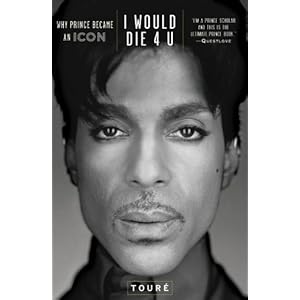Original player Touré (first Roots interview ever!) dropped his new book on Prince today, titled I Would Die 4 U. We just got a copy ourselves but you don’t have to go any further than the portrait and the ?uestlove endorsement on the cover (“I am a Prince scholar and this is the ultimate Prince book.”) to know this is going to be obsessively fascinating reading. Touré spoke with Life + Times today about some of the personal revelations he made himself about the purple one in the process of writing the book. One of the most interesting discussions is on whether Prince purposely (and fictionally) staked out a “biracial” identity for himself, even though he was raised by two black parents. Read that excerpt below, grab the book on iBookstore and read more interview at L+T.
L+T: One of the most fascinating parts is when you talk about him “passing” as biracial. Can you expand on that?
Touré: Sure. His mother is Black. I don’t have a photograph of her, but several people who met her or spoke to her told me she was Black. Think about it ethnographically: Mattie Shaw, from Louisiana, grew up in the projects, known for playing basketball very well, moves to Minneapolis, becomes a jazz singer in her early 20s, and falls in love with a marries a much older Black band leader who already had a family. It sounds like a sister to me. If that was the only thing I had, that would be circumstantial. There were no miscegenation laws in Minneapolis that I could find at that time but it was not usual. Minneapolis is one of the places I’m told that was ahead of the curve on those issues for a long time, but still, if we apply occam’s razor, it appears most likely that his mother was Black. And there’s no conversation that his father was not Black. Obviously, [he's] very light and mixed at some level, but generally, when we’re talking about mixed or biracial, we’re talking about one parent is a different race, and that is, from all the evidence we have, not the case.But, Prince very much wanted to have the largest possible audience that he could have. So, he tells a few of the first reporters who interview him that his mother is white, Italian. The way journalism goes, [if] the first three people interview somebody, report a certain fact, you may not keep asking; so if you’re the sixth, seventh, eighth person to interview him and several articles have said this is a fact – “he’s mixed, his mother’s white” – you wouldn’t keep asking that question. That’s just how we are. You might ask about being mixed, and now you’re helping him live the fantasy. Putting a white woman as his mother in Purple Rain helped push that further. What he was trying to do was not run away from being Black, he very much loved being Black and his music is unquestionably Black; but he wanted access to the larger mass culture and he also wanted to not be tied by the expectations of what being a Black recording artist would be. He wanted to break out of those boundaries. To want that in the late ’70s-early ’80s was very revolutionary, unusual and unexpected…part of the sell within that was saying, “I’m mixed,” or, “Don’t put me in the box.”
 New topic
New topic Printable
Printable
 Report post to moderator
Report post to moderator